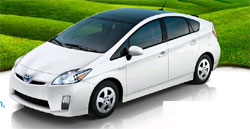Hybrid cars: how far will they go?
13 June 2009
In the economic downturn, hybrid cars have crossed the bridge from being a fad to becoming mainstream family vehicles, writes Jagdeep Worah
As the world seeks to move away from hydrocarbon fuels, 'hybrid cars' has become a buzzword. But what exactly are these, and how far are they viable for the average user?
 With governments becoming increasingly aware that hydrocarbon-driven transport is unsustainable, the focus is firmly on hybrid or 'green' cars. The current economic crunch has only helped deepen the focus on fuel-saving and environmentally safer forms of transport, and hybrid cars have crossed the bridge from being a fad to a mainstream family vehicle.
With governments becoming increasingly aware that hydrocarbon-driven transport is unsustainable, the focus is firmly on hybrid or 'green' cars. The current economic crunch has only helped deepen the focus on fuel-saving and environmentally safer forms of transport, and hybrid cars have crossed the bridge from being a fad to a mainstream family vehicle.
Lately, several countries have announced incentives for the manufacture and use of 'plug-in' cars, which can be recharged from virtually any electric outlet. In the UK, for example, motorists will be offered subsidies of up to £5,000 if they buy electric or plug-in hybrid cars. Australia and Japan, as well as several states in the US, are offering comparable incentives.
At the same time, earlier subsidies for today's standard hybrid cars - which typically run on regular fuel, combined with a self-recharging battery - are being phased out. The currently popular hybrids like the Toyota Prius and the Honda Insight won't qualify for the new incentives. This is because studies show that a plug-in vehicle is less polluting than a hybrid even if it is recharged from a coal-burning power source.
The trouble with today's plug-in or fully electric cars is that they have a very short range, and recharging them fully could take seven hours or more. The infrastructure needed is also lacking - plug points are difficult to find while driving on highways. Officials in the US and UK have admitted that eligible cars are not likely to hit the road for at least another couple of years.
However, plug-in scooters are rapidly becoming popular, as they are lightweight, easy to use, and require a shorter recharge time. In India, for example, plug-in scooters showed a remarkable 36 per cent year-on-year growth, albeit on a small base. (See: Electric vehicle maker Ultra Motor to double production in India)
